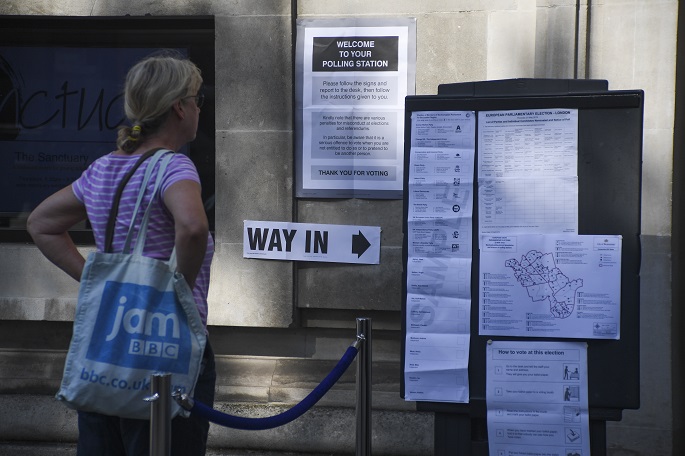British voters voice their opinions as EP elections underway
Published : 24 May 2019, 02:40
Britain's 50,000 polling stations will close their doors at 10 p.m. local time Thursday, ending a day of voting in the European Parliament election.
Extra police were on duty at some polling stations, according to media reports, citing a change in the atmosphere on the polling day.
Results won't be announced until after the other 27 members of the European Union close their voting, and with most choosing Sunday as their election day, it means an agonising wait in Britain.
If the opinion polls prove accurate, Nigel Farage's newly-established Brexit Party will gather at least a third of the available 73 seats in Brussels.
At the other end of the spectrum, British Prime Minister Theresa May's Conservatives will learn how badly they have been punished by their usually loyal voters across England.
Last minute polls gave them between 7 to 9 points, the party's most dismal performance in nearly two centuries.
Ipsos MORI said its latest poll showed that 35 percent of registered voters who say they are certain to vote would support Farage's Brexit Party, with the Liberal Democrats coming second with 20 percent.
Labour is forecast to win 15 percent of the votes, with the Conservatives trailing behind with a 9 percent share.
Many people, according to some media reports, have used the European election as an informal referendum, to send a message to Westminster politicians that the public vote in 2016 when Britain backed leaving the bloc should be honored.
A steady stream of voters headed to polling stations in village halls, community centers, shops, pubs, caravans and even a launderette, with indications that the turnout will be much lower than it was in 2014 when 35.4 percent of the more than 40 million electors took part.
As he cast his vote, Farage told journalists in Kent: "I hope to be the shortest lived MEP in history."
An MEP for UKIP (the United Kingdom Independence Party) in the last European Parliament, Farage said: "If you want Brexit, you've got to vote Brexit. We did it once, they ignored us, so we're going to tell them again.
"This time they will realise it isn't just the votes we get today, it's what we might get at a General Election that would cost them all their jobs.
"So they better listen to what people have to say today or they'll all be unemployed."
In Liverpool, retired Dave Toller, who voted Remain in 2016, commented: "What I want from the EU elections is that the far right parties do not increase their powerbase and that the socialist parties across Europe strengthen their position to the point of having strong representation at the top levels."
Entrepreneur businessman and Conservative party activist Tony Caldeira told Xinhua that he had hoped their participation in these European elections would have been unnecessary, as the British people have voted to leave the European Union.
"However, parliament has failed to deliver a deal, and has blocked no deal, so unfortunately we are having to take part in these elections by law."
The Liverpool based businessman added: "I believe this is a critical moment for our country, opposition parties should not be playing politics or acting for their own personal gain but should respect the will of the British people and deliver Brexit in the national interest."
The Independent newspaper said an unprecedented number of extra police were deployed in parts of Britain in anticipation of violence as voters went to the polls for the European elections.
Deputy Chief Constable Will Kerr, of Police Scotland, told the Independent that four units comprising about 100 public order officers would be "strategically placed" throughout the day.
Voting also took place Thursday in the Netherlands, with other countries voting between Friday and Sunday.
By early next week the new shape of the European Parliament, with its reluctant British MEPs, will become known.


